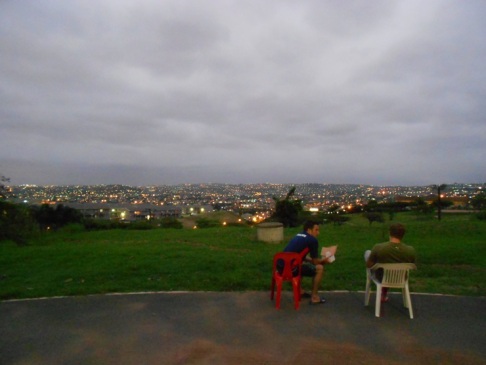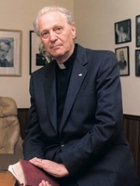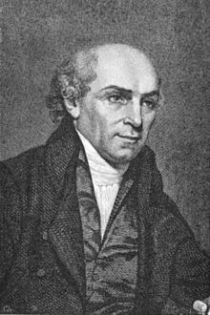
David Livingstone (1813-1873), the famous Scottish pioneer missionary and explorer of Africa, developed something of a celebrity status in 19th century Victorian Britain for his work in Africa as a missionary, explorer and slavery abolitionist, among other things. His achievements and his sacrificial devotion to opening up Africa to commerce and Christianity provided inspiration to a 19th century British public in search of a moral center to its imperialist policies in Africa. In December 1856, David Livingstone returned to England after spending fifteen years in southern and central Africa. A year later, on 4 December 1857, he gave a speech to students at Cambridge University, in which he refuted the popular idea that he had made such a great sacrifice by his endeavours in Africa:
“My object in going into the country south of the desert was to instruct the natives in a knowledge of Christianity, but many circumstances prevented my living amongst them more than seven years, amongst which were considerations arising out of the slave system carried on by the Dutch Boers. I resolved to go into the country beyond, and soon found that, for the purposes of commerce, it was necessary to have a path to the sea. I might have gone on instructing the natives in religion, but as civilization and Christianity must go on together, I was obliged to find a path to the sea, in order that I should not sink to the level of the natives. The chief was overjoyed at the suggestion, and furnished me with twenty-seven men, and canoes, and provisions, and presents for the tribes through whose country we had to pass.
In a commercial point of view communication with this country is desirable. Angola is wonderfully fertile, producing every kind of tropical plant in rank luxuriance. Passing on to the valley of Quango, the stalk of the grass was as thick as a quill, and towered above my head, although I was mounted on my ox; cotton is produced in great abundance, though merely woven into common cloth; bananas and pineapples grow in great luxuriance; but the people having no maritime communication, these advantages are almost lost. The country on the other side is not quite so fertile, but in addition to indigo, cotton, and sugarcane, produces a fibrous substance, which I am assured is stronger than flax.
The Zambesi has not been thought much of as a river by Europeans, not appearing very large at its mouth; but on going up it for about seventy miles, it is enormous. The first three hundred miles might be navigated without obstacle: then there is a rapid, and near it a coal-field of large extent. The elevated sides of the basin, which form the most important feature of the country, are far different in climate to the country nearer the sea, or even the centre. Here the grass is short, and the Angola goat, which could not live in the centre, had been seen on the east highland by Mr Moffat.
My desire is to open a path to this district, that civilization, commerce, and Christianity might find their way there. I consider that we made a great mistake, when we carried commerce into India, in being ashamed of our Christianity; as a matter of common sense and good policy, it is always best to appear in one’s true character. In travelling through Africa, I might have imitated certain Portuguese, and have passed for a chief; but I never attempted anything of the sort, although endeavouring always to keep to the lessons of cleanliness rigidly instilled by my mother long ago; the consequence was that the natives respected me for that quality, though remaining dirty themselves.
I had a pass from the Portuguese consul, and on arriving at their settlement, I was asked what I was. I said, “A missionary, and a doctor too.” They asked, “Are you a doctor of medicine?” “Yes … . .. Are you not a doctor of mathematics too?” – “No … . .. And yet you can take longitudes and latitudes.” – Then they asked me about my moustache; and I simply said I wore it, because men had moustaches to wear, and ladies had not. They could not understand either, why a sacerdote should have a wife and four children; a joke took place upon that subject. I used to say, “Is it not better to have children with than without a wife?” Englishmen of education always command respect, without any adventitious aid. A Portuguese governor left for Angola, giving out that he was going to keep a large establishment, and taking with him quantities of crockery, and about five hundred waistcoats; but when he arrived in Africa, he made a ‘deal’ of them. Educated Englishmen seldom descend to that sort of thing.
A prospect is now before us of opening Africa for commerce and the Gospel. Providence has been preparing the way, for even before I proceeded to the Central basin it had been conquered and rendered safe by a chief named Sebituane, and the language of the Bechuanas made the fashionable tongue, and that was one of the languages into which Mr Moffat had translated the Scriptures. Sebituane also discovered Lake Ngami some time previous to my explorations in that part. In going back to that country my object is to open up traffic along the banks of the Zambezi, and also to preach the Gospel. The natives of Central Africa are very desirous of trading, but their only traffic is at present in slaves, of which the poorer people have an unmitigated horror: it is therefore most desirable to encourage the former principle, and thus open a way for the consumption of free productions, and the introduction of Christianity and commerce. By encouraging the native propensity for trade, the advantages that might be derived in a commercial point of view are incalculable; nor should we lose sight of the inestimable blessings it is in our power to bestow upon the unenlightened African, by giving him the light of Christianity. Those two pioneers of civilization – Christianity and commerce – should ever be inseparable; and Englishmen should be warned by the fruits of neglecting that principle as exemplified in the result of the management of Indian affairs. By trading with Africa, also, we should at length be independent of slave-labour, and thus discountenance practices so obnoxious to every Englishman.
Though the natives are not absolutely anxious to receive the Gospel, they are open to Christian influences. Among the Bechuanas the Gospel was well received. These people think it a crime to shed a tear, but I have seen some of them weep at the recollection of their sins when God had opened their hearts to Christianity and repentance. It is true that missionaries have difficulties to encounter; but what great enterprise was ever accomplished without difficulty? It is deplorable to think that one of the noblest of our missionary societies, the Church Missionary Society, is compelled to send to Germany for missionaries, whilst other societies are amply supplied. Let this stain be wiped off. – The sort of men who are wanted for missionaries are such as I see before me; men of education, standing, enterprise, zeal, and piety. It is a mistake to suppose that any one, as long as he is pious, will do for this office. Pioneers in every thing should be the ablest and best qualified men, not those of small ability and education. This remark especially applies to the first teachers of Christian truth in regions which may never have before been blest with the name and Gospel of Jesus Christ. In the early ages the monasteries were the schools of Europe, and the monks were not ashamed to hold the plough. The missionaries now take the place of those noble men, and we should not hesitate to give up the small luxuries of life in order to carry knowledge and truth to them that are in darkness. I hope that many of those whom I now address will embrace that honourable career. Education has been given us from above for the purpose of bringing to the benighted the knowledge of a Saviour. If you knew the satisfaction of performing such a duty, as well as the gratitude to God which the missionary must always feel, in being chosen for so noble, so sacred a calling, you would have no hesitation in embracing it.
For my own part, I have never ceased to rejoice that God has appointed me to such an office. People talk of the sacrifice I have made in spending so much of my life in Africa. Can that be called a sacrifice which is simply paid back as a small part of a great debt owing to our God, which we can never repay?- Is that a sacrifice which brings its own blest reward in healthful activity, the consciousness of doing good, peace of mind, and a bright hope of a glorious destiny hereafter? – Away with the word in such a view, and with such a thought! It is emphatically no sacrifice. Say rather it is a privilege. Anxiety, sickness, suffering, or danger, now and then, with a foregoing of the common conveniences and charities of this life, may make us pause, and cause the spirit to waver, and the soul to sink, but let this only be for a moment. All these are nothing when compared with the glory which shall hereafter be revealed in, and for, us. I never made a sacrifice. Of this we ought not to talk, when we remember the great sacrifice which HE made who left His Father’s throne on high to give Himself for us.”
– David Livingstone (1813-1873), Speech to students at Cambridge University, 4 December 1857










